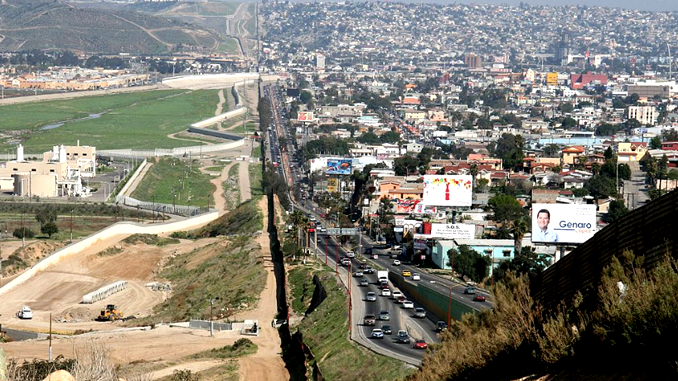
“Judge Jon S. Tigar of the United States District Court in San Francisco issued a temporary restraining order that blocks the government from carrying out a new rule that denies protections to people who enter the country illegally. The order, which suspends the rule until the case is decided by the court, applies nationally,” the New York Times reported.
“Whatever the scope of the president’s authority, he may not rewrite the immigration laws to impose a condition that Congress has expressly forbidden,” Tigar wrote in his ruling.
(ICYMI, here is more on Judge Tigar, who, on Friday, issued a 55-page ruling issuing a preliminary injunction blocking the Trump administration from enforcing a new policy change in the way the military now handles non-citizen enlistees/recruits because of “national security reasons,” without presenting evidence to back up its claims, saying “is by definition arbitrary and capricious.”)
Two days after November 6 midterm elections it was reported (see TNB here) that “on the heels of sending 5,200 American troops to the US-Mexico border and pledging to terminate birthright citizenship via executive fiat, President Trump now plans to issue an executive order revamping the United States asylum process,” according to the NewBlender story, via the Wall Street Journal.
On Nov 9, “A Proclamation” was written by the Trump administration and signed by Donald Trump, saying, in part,
NOW, THEREFORE, I, DONALD J. TRUMP, by the authority vested in me by the Constitution and the laws of the United States of America, including sections 212(f) and 215(a) of the Immigration and Nationality Act (INA) (8 U.S.C. 1182(f) and 1185(a), respectively) hereby find that, absent the measures set forth in this proclamation, the entry into the United States of persons described in section 1 of this proclamation would be detrimental to the interests of the United States, and that their entry should be subject to certain restrictions, limitations, and exceptions.
“Proclamations” – White House.gov Nov 9 2018
You can read “the proclamation” in full here, at White House.gov.
According to the TNB report on Nov 8, “White House officials familiar with the matter told the WSJ that the aim was to restrict asylum requests to those made at designated ports of entry along the border.”
The WSJ wrote, “according to the directive, U.S. officials will require asylum seekers to go to a point of entry along the border and make a claim for asylum, which would bar those who cross illegally. Currently, migrants who cross the border into the U.S. have up to a year to request asylum, regardless of how they got here.”
However, when the Trump administration issued and submitted the Nov 9 proclamation into the registry they made it go into effect immediately and “without the customary period for public comment,” as well as, according those involved in bringing the case, overstepped congressional and established asylum laws.
“The law is clear: People can apply for asylum whether or not they’re at a port of entry, and regardless of their immigration status,” said Omar Jadwat, the director of the American Civil Liberties Union’s Immigrants’ Rights Project. “The president doesn’t get to ignore that law, even if he dislikes it.”
The new regulations draw upon the same authority Mr. Trump used to ban travel from several predominantly Muslim countries only days after his inauguration and are certain to be challenged in court.
Lawyers for immigration advocacy organizations said they violated a founding principle of federal asylum: to judge each person’s asylum claim on its own merits. And the lawyers said federal and international law made it clear that the United States must provide immigrants the opportunity to claim asylum regardless of whether they entered the country legally or illegally.
The Boston Globe
The Trump administration is drawing upon the same approach they used for the Muslim travel ban they issued days after his inauguration in Jan 2017.
The Supreme Court eventually upheld portions of the Muslim travel ban this past summer with Chief Justice Roberts saying the Immigration and Nationality Act gives the president broad authority over immigration, which states, in part, the president “may by proclamation, and for such period as he shall deem necessary, suspend the entry of all aliens or any class as immigrants or nonimmigrants, or impose on the entry of aliens any restrictions he may deem to be appropriate.”
Roberts wrote in his ruling, the immigration act “exudes deference to the president in every clause.”
However, here, plaintiffs argue that the administration has effectively superseded the law and is “effectively introducing what they deem an asylum ban.”
The Trump administration issued a statement in response to today’s ruling from Judge Tigar through the Department of Homeland Security spokeswoman Katie Waldman and the Justice Department spokesman Steve Stafford, saying, “Our asylum system is broken, and it is being abused by tens of thousands of meritless claims every year.”
They said the president has broad authority to stop the entry of migrants into the country. “It is absurd that a set of advocacy groups can be found to have standing to sue to stop the entire federal government from acting so that illegal aliens can receive a government benefit to which they are not entitled,” they said. “We look forward to continuing to defend the executive branch’s legitimate and well-reasoned exercise of its authority to address the crisis at our southern border.”
New York Times
According to immigration scholar Stephen Yale-Loehr at Cornell Law School, “Presidents indeed have broad discretion on immigration matters. But the court’s ruling shows that such discretion has limits,” adding that the ruling is a “significate blow to the administration’s efforts to unilaterally change asylum law,” and expects this will “ultimately” end up in the Supreme Court “for a final ruling.”
Judge Tigar’s temporary, nationwide injunction will go into effect immediately and will last through until December 19, which is when Tigar has set the date to hear considerations about issuing a “more long-lasting injunction.”

3 Trackbacks / Pingbacks
Comments are closed.